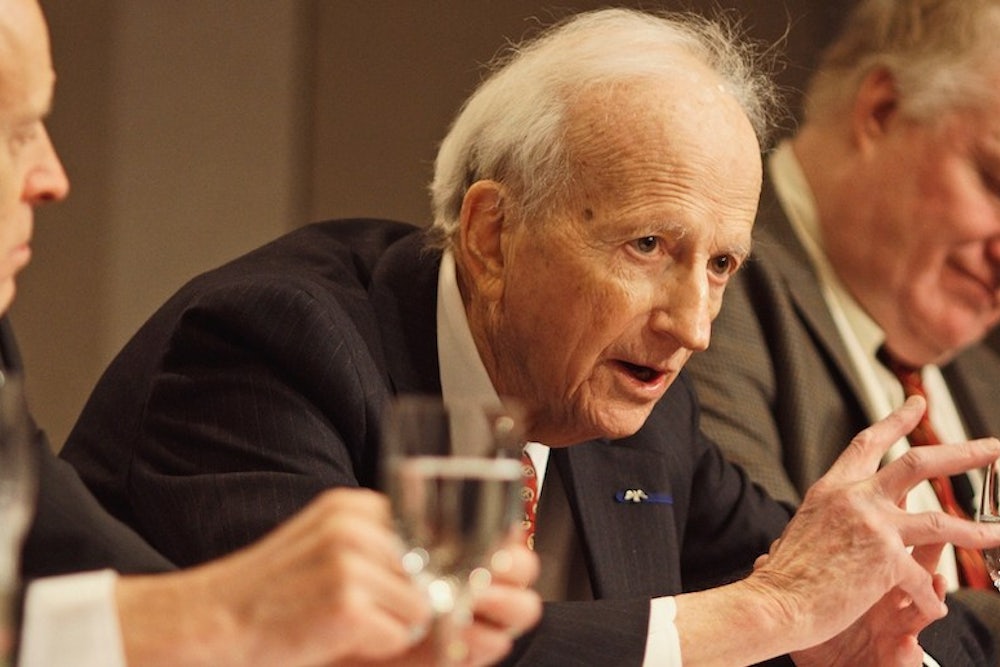Gary Becker, a giant among social scientists, died Saturday at the age of 83. Becker fused the cool logic of economic reason with a fiery imagination, a combination that enabled him to use economics to enlighten wide swaths of human behavior. He transformed a discipline that had been tied to traditional topics, like business cycles, international trade, and money supply, into an intellectual field without boundaries.
Becker’s intellectual lineage was noble. He was a student of the distinguished international-trade expert Jacob Viner at Princeton, and then Viner’s former student, Milton Friedman, at the University of Chicago. At Chicago, Becker was encouraged by a remarkable coterie of scholars, including Frank Knight and especially H. Gregg Lewis, to develop his field-redefining vision. While Becker’s undergraduate thesis on international trade (published in the American Economic Review) was brilliant but largely conventional, his doctoral dissertation on The Economics of Discrimination was radical.
Economists didn’t study discrimination in the 1950s, unless it was the price discrimination practiced by railroads. Gunnar Myrdal’s 1944 An American Dilemma: The Negro Problem and Modern Democracy may have later won the author the Nobel Prize in Economics, but he was seen by Americans as more of a sociologist than an economist, and he was a Swedish Social Democrat to boot. Becker emerged from a citadel of American economics, using the increasingly mathematical tools that would come to define economics.
The Economics of Discrimination noted that firms led by racist leaders should earn less money than firms that just try to maximize profits. This insight countered those who saw an intrinsic link between capitalism and racism, but Becker’s logic is inescapable: Maximization subject to a constraint (racism) does less well than unconstrained maximization. The same logic also implies that racist workers will earn less money, and racist homebuyers will pay more for housing. It does not imply that whites cannot benefit, however, if they collectively rig the system against African-Americans. Becker’s subversive message was that, in the right circumstances, the quest for profits can be a force for tolerance.
Becker left Chicago to teach at Columbia, where he developed his life-long friendship with the physically and intellectually over-sized George Stigler, and began training students of his own. His work during the Columbia years, which lasted from 1957 until Becker’s return to Chicago in 1969, is captured by two books: Human Capital, published in 1964, and The Economic Approach to Human Behavior, published in 1976 but containing many essays written in the 1960s.
Human Capital is a masterful treatment of one topic, explored using both theory and data, answering many questions and broaching others that are still left unsolved. Why should firms invest in workers’ general skills if those skills enable workers to bargain for better wages? Do credit constraints explain why more people don’t take advantage of the apparently large returns to schooling? My favorite moment in the book occurs when Becker explains a mathematical result—longer life spans call for more investment in human capital—by noting the expenses that are lavished on training long-lived elephants.
But The Economic Approach to Human Behavior more broadly illustrates how Becker broke down the barriers that once fettered economics. He writes on crime, marriage, time allocation, competition in democracy, irrationality, and the tradeoff between the quantity and quality of children. My wife (the youngest of six) disagrees vehemently with the last one, but it is true that the fertility revolution towards smaller households was historically associated with significant increases in education. The introduction is the best single statement of Becker’s approach to social science.
His essay on crime and punishment, published first in 1968, began the economics profession’s interest in the impact of deterrence and incapacitation on crime rates. The power of the approach stems from recognizing that there is nothing irrational about most criminals—indeed, most of us break the law on a daily basis, speeding or jaywalking. We should respect criminals enough to recognize that they won’t change their chosen occupation merely because they spend some time in jail. Ergo, there is nothing irrational about high levels of recidivism. The much higher murder rates in many Latin American countries can be explained easily by the low probability that a murder will lead to an arrest.
In the Chicago decades that followed, Becker returned to the family, political competition, social economics, and dozens of other topics. His papers were often debatable, but they were never without insight. Since the 2006 downturn, economists have returned to debating the policies of recession and poverty. These are valuable discussions, and Becker joined in them, but they are less exciting than the bolder business of striking new intellectual ground. One of the many reasons I hope for a full and widespread recovery is that I miss the Beckerian agenda of shedding light on all of human society.
Becker’s contributions are only partially in print under his own name. His introductory “Price Theory” course (that’s “microeconomics” to those outside of Chicago) was a core intellectual experience in the life of most Chicago Ph.D. students. It was in mine. No one could equal him in seminars, where it sometimes felt as if the intellectual river of the Scottish Enlightenment ran through his veins. He was unfailingly generous with his students and has remained an inspiration for my entire life. Every day I write or teach, I hope to be worthy of having been Becker’s student.
Becker was also a moral force. His belief in the power of scholarship was inspiring. His commitment to truth over all subverts the economists’ natural belief in the social value of earning money. He gave his life to economics and it was a life well given.
